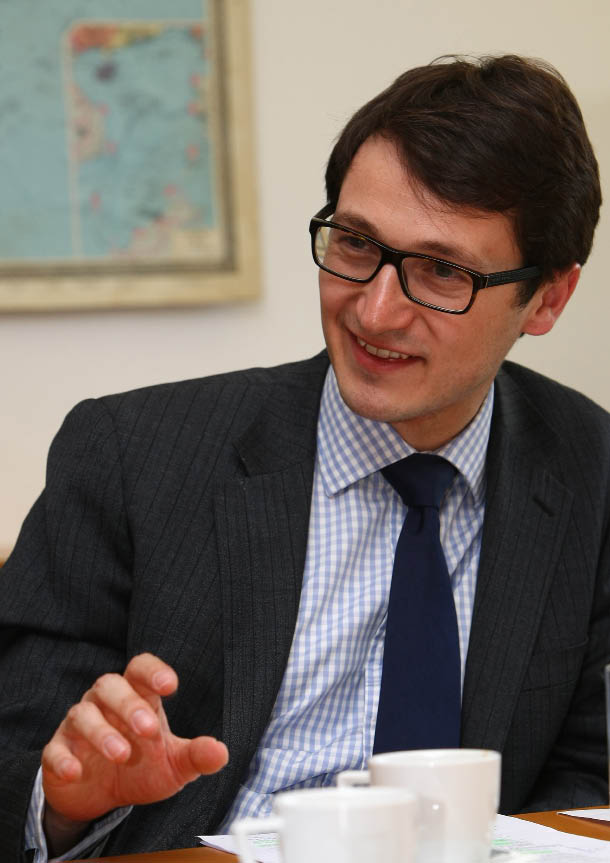S&ED Promotes Stable and Cooperative Sino-U.S. Ties
By ZHU FENG
The Sixth U.S.-China Strategic and Economic Dialogue (S&ED) convenes in Beijing this July. President Obama’s Special Representative and Treasury Secretary Jacob Lew visited China ahead of the event, from May 11 to 13, to meet with Chinese Premier Li Keqiang and Vice Premier Wang Yang. The two sides reached consensus on the basic content of the coming S&ED.
There have been contentions recently between China and the U.S., but past experience has shown that as long as both countries maintain top-level dialogue and control disputes through proactive communication, so confronting differences and building consensus, there is no obstacle that cannot be overcome.
Significant Dialogue Mechanism
There are 60 or more dialogue and cooperative mechanisms between China and the U.S., on different levels and in varied fields. The S&ED, attended by the highest-ranking officials and which addresses the broadest range of strategic issues, stands head and shoulders above the rest.
Back in 2006, then Chinese President Hu Jintao and his U.S. counterpart President George W. Bush jointly founded the Economic Dialogue. The annual event marshals the two countries’ top economic, finance and foreign affairs officials and policymakers from relevant government departments to meet and discuss economic policies. Upon President Obama’s taking office in January 2009, leaders of the two countries, cognizant of growing competitiveness within as well as integration of their primary economic and security interests, decided to extend this dialogue to include security, defense and strategic issues. The S&ED thus came into being. It is convened annually, alternately in the Chinese and U.S. capitals.
The first S&ED convened in May 2009 in Washington. Then Chinese Vice Premier Wang Qishan and State Councilor Dai Bingguo headed the Chinese delegation, and then U.S. Secretary of State Hillary Clinton and Treasury Secretary Timothy Franz Geithner led the American delegation to the four sessions from 2009 to 2012. The meetings significantly promoted communication and cooperation on an array of issues that included economy, finance, trade, environment and climate change, exchange rate, bilateral investment, Internet security and hot regional security issues.
In 2013, the year of Obama’s second term, China also elected its new top leadership headed by President Xi Jinping. The administration change led to a reshuffle at the S&ED. Chinese vice premier in charge of economic and financial issues Wang Yang, and State Councilor Yang Jiechi took over the helm of the Chinese delegation. Secretary of State John Kerry and Treasury Secretary Jacob Lew, meanwhile, headed the U.S. team.
The humor and wit of a seasoned statesman that Vice Premier Wang Yang’s speech displayed at the opening on July 10, 2013 of the Fifth S&ED impressed other participants. Wang likened the highly interdependent economic relationship between China and the U.S. to that between a husband and wife. To be happy they cannot dream different dreams while sleeping in the same bed, but must pool efforts towards a shared life. He quipped that during this visit to the States, his first in a decade, he was relieved to see that “Americans are still heavier built and with bigger noses than us.” Wang went on to say that since the eruption of the global financial crisis in 2008 there had been widespread worries in the U.S. that the superpower was over the hill. Some Chinese people, meanwhile, have begun to feel swell headed over predictions that their country will soon surpass the U.S. His remarks brought laughter from many in the audience.
Fresh Challenges for the Sixth S&ED
Both parties might feel somewhat uncomfortable in the run-up to the Sixth S&ED. The Obama administration has over-represented itself in the South China Sea and East China Sea issues. Big Brother-like, it has lurked and meddled in marine disputes between China and certain ASEAN members. Vietnam’s confrontation with China over Drilling Rig 981 is attributable to the former being emboldened by U.S. reassurances to its allies and defense partners of its influence in Asia. In spite of the oil platform’s mere 17 nautical miles from China’s Zhongjian Island, the U.S. nevertheless pronounced it as within Vietnam’s exclusive economic zone, and accused China of “provocation.” At the Pentagon news conference on May 16, visiting Chinese General Fang Fenghui urged the U.S. to remain objective over the drilling dispute. He made it clear that China would not give way under external pressures but go ahead with the project.
On May 18 the U.S. indicted five Chinese army officers, alleging they had hacked into American businesses to steal trade secrets. This is a far cry from the consensus the two countries reached at the S&ED – of solving disputes, including those over cyber security, through negotiations. The arbitrary charges against the five Chinese officers have cast a shadow over the S&ED and the cooperative spirit it embodies, for the entire Sino-U.S. relationship hinges on cooperation and mutual trust.

